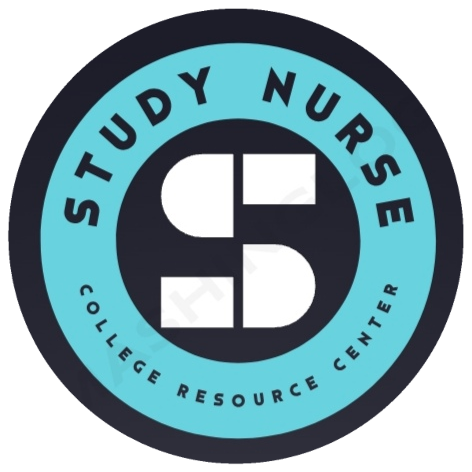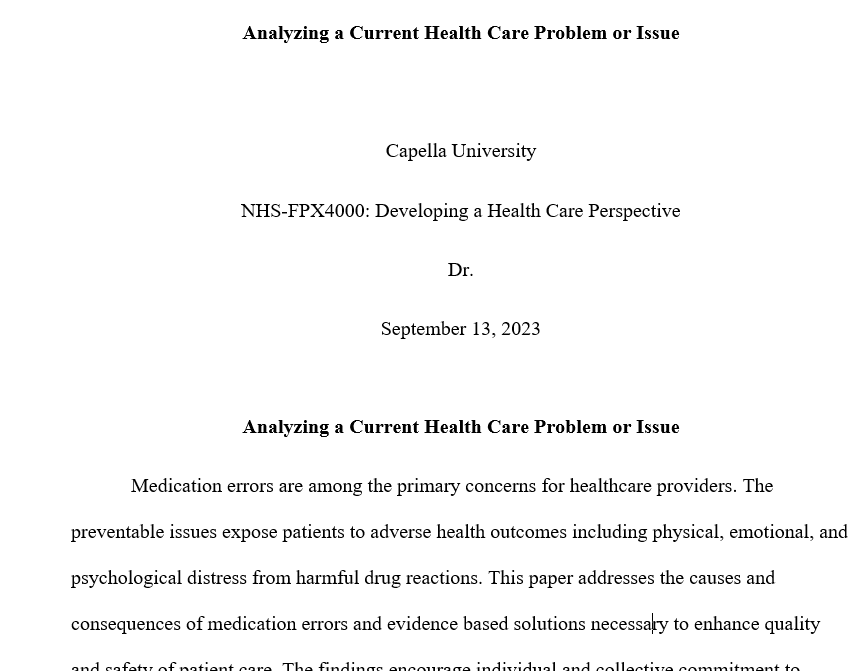Capella University
NHS-FPX4000: Developing a Health Care Perspective
Dr.
September 13, 2023
Analyzing a Current Health Care Problem or Issue
Medication errors are among the primary concerns for healthcare providers. The preventable issues expose patients to adverse health outcomes including physical, emotional, and psychological distress from harmful drug reactions. This paper addresses the causes and consequences of medication errors and evidence based solutions necessary to enhance quality and safety of patient care. The findings encourage individual and collective commitment to identifying and intercepting errors across the care continuum.
Elements of Medication Errors
Medication errors are a serious concern for healthcare professionals, patients, families, and organizations. One concern is wrong medications administered to patients, which cause adverse drug reactions, mortality, and morbidity threats. The fatal medical error and legal proceedings for negligent homicide demonstrate the need for proactive prevention plans (Çetin & Cebeci, 2021). In the case, a nurse administered the wrong medication to a patient. The patient died due to the professional’s decision to remove the wrong drug from cabinets, overlook warnings on vial, and failure to monitor vital signs after administering the medication. Thus, negligence is among the serious concerns that undermine commitment to sustaining a safe clinical environment.
Analysis
Medication errors are preventable incidents that undermine the quality and safety of patient care. Specifically, administering the wrong drugs is a malpractice that undermine professionals’ adherence to practice standards. The problem raises questions about compliance with patient-centered practices and ethical guidelines such as beneficence and non-maleficence. Patients are vulnerable to adverse drug reactions, increased complications, and the risk of premature death (Çetin & Cebeci, 2021).
Further, medication errors trigger readmissions, prolonged hospitalization, and additional cost of care for patients and the organization. Increased vigilance is necessary to protect patients from adverse health outcomes caused by negligence, miscommunication, staff burnout, ineffective supervision, and weak oversight. Further, wrong medication administration reinforces the need for adequate training and complete adherence to policies and procedures on quality and safety of patient care.
Considering Options
Wrong medication administration is preventable through robust technical, administrative, and human aspects. Organizations should embrace automated medication processes to minimize errors associated with staff burnout and operational inefficiencies. Technologies such as barcodes enhance medication accuracy and patient identification (Salami et al., 2019). The goal is to improve verification and information flows across the care continuum. Adequate training is also necessary to enable the care team acquire knowledge, skills, and experience in administering medications. The process reminds nurses, physicians, and pharmacists about the value of effective communication, collaboration, and accurate patient and medication verification to optimize outcomes (Salami et al., 2019). Oversight and double verifications are viable approaches for preventing medication errors.
The practices enhance vigilance with members of the care team collaborating to identify and intercept errors before administering medications. Oversight and verification also prevents medical negligence, disruptions, and workload common in a complex healthcare environment (Cetin & Cebeci, 2021). Supervision is also crucial to monitor workforce actions and promote complete compliance with safety standards. The process allows leaders to remind the care team about the consequences of malpractices such as overlooking warnings on medication vials, failure to monitor vital signs and report errors after administering medications, and negligent removal of medications from prescribing cabinets.
Solution
The solution is double verification practices before administering medications. The process entails two qualified professionals independently checking medications before administration to a patient. Nurses are responsible for monitoring, discussing, and sharing information on risks and implications on patients. With double verification, there are opportunities available to assess risks, detect errors, report incidents, and intercept threats before causing harm to patients (Koyama et al., 2020).
Collaborative frameworks reinforce commitment to eliminating distractions, negligence, poor communication, and weak supervision across the care continuum. Double verification allows nurses to intercept errors before they cause harm to patients (Mohmmed & El-sol, 2017). The mitigation technique allows professionals to read and compare information on medication label and familiarize with a patient’s medical history. The duration could be three times before a patient takes the medication. The benefits include reduced confirmation bias associated with single identification and effective response to high-risk situations and high-alert medications.
Ethical Implications
Medication administration errors increase scrutiny about healthcare professionals’ compliance with ethical tenets of health care practice. The consideration include making informed decisions, benefitting patients, and adopting adequate follow-up assessments to prevent undesirable outcomes. Double verification of medication makes the care team responsive to the principles of beneficence and non-maleficence (Vaismoradi et al., 2021). Safe medication administration requires healthcare professionals to use clinical judgment to avoid causing harm to patients and do well consistently.
For instance, verifying and validating drugs before administering to a patient demonstrate commitment to doing what is best for the client. Double verification allows nurses to take the necessary steps to prevent unnecessary worry and suffering to patients (Koyama et al., 2020). Autonomy in medication errors entail informing patients about the plan and explaining incidents whenever they occur. Honest discussions about a medication error and potential effects help maintain trust and adherence to instructions on verification and efforts to minimize harm.
Implementation
The implementation process involves training and education the nursing team on independent double-checking and its influence on adherence to the right of medication. Roles plays and case scenarios will help the audience understand the importance of double verification as part of the plan to enhance oversight and protect patients from adverse outcomes (Koyama et al., 2020). The training will be more specific regarding the handling of high-risk patients and high-alert medications. For instance, a second patient will check the drug, dosage, and patient’s identity to minimize errors.
A nurse educator will provide comprehensive explanations on safe practices for calculating dosages, watching a colleague preparing medications, and checking if everything matches policies and guidelines. The training will also make everyone aware of high-alert medications such as insulin and IV opiates that require double-checking before administration. In the end, the nursing team will take greater care when verifying medication, as they are aware that double-checking and collaborative practices help optimize safety outcomes.
Conclusion
Healthcare professionals should take greater care when handling medications. Issues such as inadequate training, weak supervision, ineffective communication, and negligence undermine organizational commitment to maintaining safe medication administration. Double-verification is an option available for nurses to collaborate with colleagues, physicians, and pharmacists to identify and intercept errors. The process encourages individuals to embrace team-based values and attitudes towards monitoring preparation and administration processes.
The intervention enhance vigilance and oversight necessary for protecting patients against the risks of readmissions, prolonged hospitalization, and additional costs triggered by adverse drug reactions. The health care team should consider ethical implications of their actions. Awareness about the ethical tenets of beneficence, non-maleficence, and autonomy enables healthcare professionals to make informed decisions and promote patient-centered practices across the continuum. The goal is to enhance vigilance and collaborate in identifying risks and collaboratively intercepting errors.
References
Çetin, S & Cebeci, F. (2021). Perceptions of clinical nurses about the causes of medication administration errors: A cross-sectional study. Florence Nightingale Journal of Nursing, 29(1), 56-64. https://www.ncbi.nlm.nih.gov/pmc/articles/PMC8137725/
Koyama, A., Maddox, C. S., Li, L., Bucknail, T., & Westbrook, J. (2020). Effectiveness of double-checking to reduce medication administration errors: A systematic review. BMJ Quality & Safety, 29(7), 595-603. https://pubmed.ncbi.nlm.nih.gov/31391315/
Mohmmed, R. G., & El-sol, A. E. (2017). Nursing innovations: Medication administration errors and safety. Journal of Nursing and Health Science, 6(3), 75-85. https://www.researchgate.net/publication/317331330_Nursing_Innovations_Medication_Administration_Errors_and_Safety
Salami, I., Subih, M., Darwish, R., Al-Jbarat, M., Saleh, Z., Maharmeh, M., Alasad, J. & Al-Amer, R. (2019). Medication administration errors. Journal of Nursing Care Quality, 34 (2), 7-12. https://pubmed.ncbi.nlm.nih.gov/29975215/
Vaismoradi, M., Moe, C.F., Vizcaya-Moreno, F., & Paal, P. (2021). Ethical tenets of PRN medicines management in healthcare settings: A clinical perspective. Pharmacy, 9(4), 1-10. https://www.ncbi.nlm.nih.gov/pmc/articles/PMC8552074/pdf/pharmacy-09-00174.pdf

